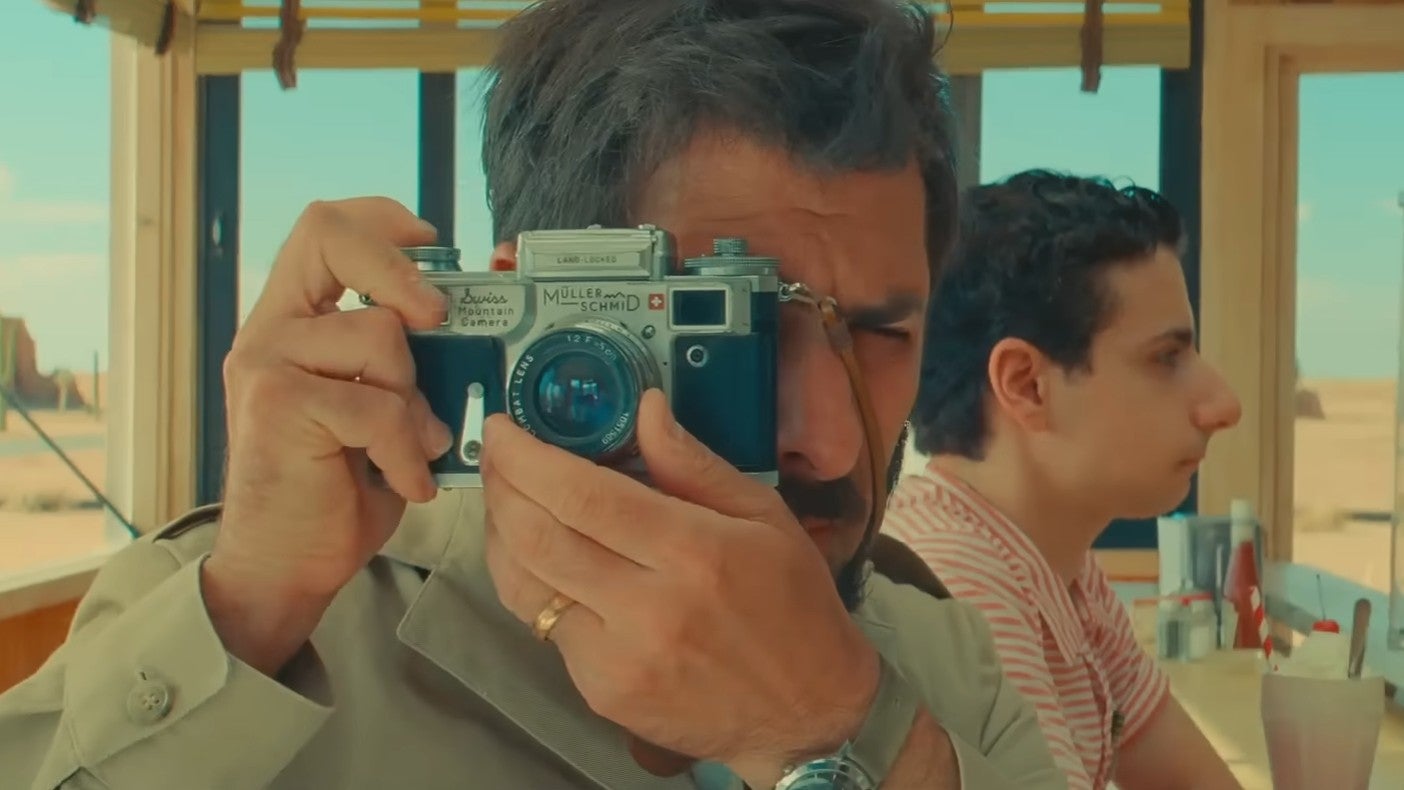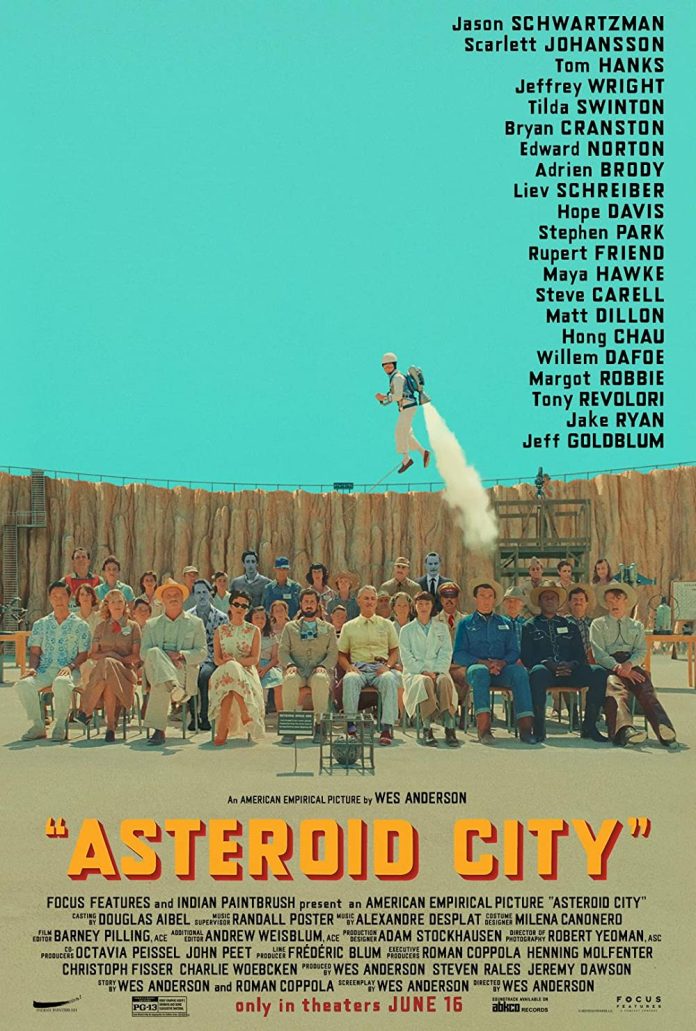Wes Anderson’s newest film is a detail-laden homage to mid-century film and television. It checks all the boxes of what the filmmaker is best known for, for better or for worse.
We’ve reached a critical inflection point regarding the perceived merits of Wes Anderson as a filmmaker. Unfortunately this precipice upon which we stand, peering over the ledge into pop culture abyss, is not a result of Wes Anderson’s accomplishments as a filmmaker. That’s a problem. Anderson’s unique approach to making films is no longer a quirky breath of fresh air for those of us who enjoy something off the beaten path. It’s become so widely known that those who regurgitate the work of others for their own benefit have latched on and disseminated it to the meme-obsessed masses. What once was revered for its painstakingly stubborn attention to detail has now been written off as pretentious because it can be recreated instantly with AI.

Like all of Wes Anderson’s films Asteroid City is not going to convert anyone who didn’t already appreciate the director’s bespoke style. But I fear the number of those followers is dwindling because of the filmmaker’s arrival into the mainstream without making the types of films that resonate on the mainstream. Meticulously crafted as ever, Asteroid City finds Wes Anderson approaching science fiction while honoring his inspiration for mid-century westerns. With an ensemble cast and shifty narrative structure, some may call it pretentious. But this accusation suggests the director is only making a film to satisfy his own interests, and that couldn’t be farther from the truth.
Asteroid City
Directed By: Wes Anderson
Written By: Wes Anderson
Starring: Jason Schwartzman, Scarlet Johansson, Edward Norton, Jake Ryan
Release Date: June 16, 2023
Like most of his other films, Asteroid City is driven by Wes Anderson’s endearing curiosity. It’s more than just a filmmaker intentionally driving into the weeds for the sake of finding some off-beat rhythm to satisfy some insatiable mad-scientist urge. Anderson puts on a show. He invites you into his mind, and then curates the perspective so as to better understand his intentions. If it was just about being weird, there would be no structure.
What he has always done well as a storyteller is frame his narrative in a way that aligns the audience’s intentions with his own. It can be heavy handed at times, but allows for a unique perspective that would not otherwise be possible within the limited runtime of a feature film. Grand Budapest Hotel was framed as the story behind a hit novel, The French Dispatch was the inspiration behind the stories of a magazine. Asteroid City is framed as a television production about the making of a play within a play.
The main play, and bulk of the story takes place in the fictional desert town of Asteroid City, where several families have traveled to attend an astronomy convention. Recently widowed war photographer Agie Steenbeck (Jason Schwartzman) and his children struggle with life after death. He strikes up an unlikely relationship with Actress Midge Campbell (Scarlett Johansson), who is teetering on the brink of existential catastrophe herself. When an alien sighting occurs, the army moves in to quarantine the town and the seeming futility of everyday life becomes even more chaotic. Interspersed between these scenes are flashbacks in black and white that add context to the play’s themes through the real-life lives of the people who wrote and act in it.

When you think about it, the ultimate expression of Anderson’s approach as a filmmaker is as a crafter of a dynamic stage play for the screen. We’ve seen flashes of this literal approach throughout his career in his set constructions, title cards, and characterizations. Asteroid City plays off this inspiration directly. In this manner, it does feel both creative and new but also expected and derivative since the concept fits so well within Anderson’s technique. But while Anderson’s newest film doesn’t exactly surprise you in its approach, it does have some tricks up its sleeve.
Like Birdman, there’s a surreal blend of performance and behind-the-scenes, and the “play” works as a semi-autobiographical exploration of the actors/creators behind it. Asteroid City flips the script and the sequences of the play are more “realistic” while the behind-the-scenes sequences are crafted like they are on stage. Unfortunately, the massive amount of characters makes any sort of insight glimpsed from these flashbacks as fleeting at best. They are vignettes into the psyches of people we don’t know very well, and so they are more important as envoys of the film’s themes and artistic intentions than as methods of characterization.
Anderson’s films have mostly always had large casts of characters, but in this film his focus upon them is more scattered than it had been in the past. Asteroid City is full of the types of fascinatingly reserved characters we have come to expect and love from Anderson, but too often are showcased in ways that don’t directly impact the plot. Likewise, with more focus on side characters, there’s less opportunity for the main characters (and their “actors”) to shine. Anderson’s previous films like Moonrise Kingdom and The Grand Budapest Hotel worked well because they had a central duo or trio of characters around which both the narrative and the rest of the ensemble orbited. While Asteroid City has two main characters, much of the film has nothing to do with them.
And so in lies the main criticism I have of Asteroid City. Instead of spiraling inwards towards profound inspiration, Asteroid City splinters outwards into orchestrated chaos. It is a scattershot of vignettes with ideas on multiple levels, held together under the premise of an artistic production. It is trying to be both open-ended and philosophical while also cute and down-to-earth. It results in a thematic rollercoaster that is equally entertaining and frustrating. An alien visits earth but it’s mostly an inconvenience for the characters because they can’t leave. We follow the play’s writer as he struggles to find purpose and inspiration with his writing, but he dies halfway through.

These observations are a metaphor for Anderson’s own relationship with his work, lending the film a subtle autobiographical connection whether intentional or not. Each of us is blinded by our passions. We become so caught up in the process we forget about the end goal. Anderson makes an effort to push the boundaries into something more expansive, but it seems like he can’t quite evolve his eccentricities to match the widening scope. He falls in love with his characters (as do the audience), so it is hard to not try and spend time with each of them. The impressive production, cinematography, and compelling dialogue capture our attention but when the play’s director has to explain the meaning he can’t quite put it into words.
Obsession is a required ingredient for great filmmakers, the trick is translating that enthusiasm to the audience. Asteroid City no doubt demonstrates the lengths at which Andersion is prepared to achieve his vision as a filmmaker, but it doesn’t really make that exploration as effortless as his best work has been. Those who don’t share his fascination with detail will call it pretentious. Those who want more characterization will accuse him of playing dollhouse on the big screen. Neither criticism is incorrect, but both kind of miss the point of an Anderson film in the first place. Like the characters in the film, Asteroid City is about cinematic limbo – the area in between inspiration and the final destination.















